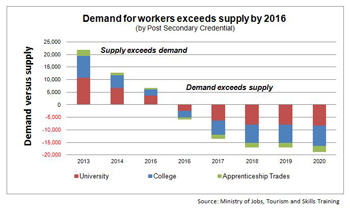Provincial Skills Deficit Looming in 2016

More jobs than qualified people unless post-secondary capacity expanded
A severe skills shortage will hit BC in 2016 and continue to grow, unless action is taken now to improve access to all types of post-secondary education—university, college and trades.
The BC Labour Market Profile released today by the Research Universities’ Council of BC (RUCBC) and based on the provincial government’s BC Labour Market Outlook as well as BC Stats and Statistics Canada data, reveals that in 2016 the number of jobs requiring university, college or trades credentials will exceed the supply of BC graduates, a skills deficit that will continue to grow through to 2020.
In 2020, approximately 18,800 jobs will go unfilled because too few British Columbians have the necessary education and training. 8,400 of these jobs will require a university degree, 8,100 a college credential, and 2,300 trades training.
“To secure tomorrow’s jobs and power a strong economy driven by new ideas and innovation, BC needs to expand the capacity of its nationally-recognized post-secondary system and make it possible for every qualified British Columbian to build a bright future,” says University of Victoria President David Turpin.
“That’s why BC’s universities have put forward an Opportunity Agenda for BC that calls for an investment in BC’s future now so that British Columbians can take full advantage of the opportunities ahead.”
Royal Roads University President Allan Cahoon said the Opportunity Agenda proposes three practical steps to fill the growing skills gap and secure our economy:
- A space for every qualified student, with 11,000 new student spaces in university, college and trades training over the next four years;
- A guarantee for students in need, with resources invested in grants, scholarships and improvements to student loans; and
- A commitment to innovation and jobs by establishing an Innovate BC initiative, bringing government, business, and post-secondary institutions together to build on BC’s research and innovation potential, advance new opportunities, and help drive economic growth.
“Students have long advocated strengthening the student support system in BC so that it’s possible for potential students to attend university without being saddled with unmanageable debt when they come out the other side,” says Lucia Heffelfinger Orser, director of external relations at the UVic Students’ Society. “If we are going to address the skills shortage in this province and make education more accessible, government needs to step up and adopt the strong plan that the RUCBC has put forward in The Opportunity Agenda.”
“I am filled with hope and ambition that through my pursuit of academic success, I will be able to acquire a rewarding professional career,” says Melissa Henry, RRU Student Association On-Campus president. “I believe that the Opportunity Agenda offers incentives of hope, ambition, and success for the residents of BC. Everyone in BC should have access to a brighter future.”
“Business recognizes a highly qualified workforce is key to economic success. The supply of qualified labour is already limited in some areas and that will deteriorate further due to demographic shifts and job growth. The Opportunity Agenda goes a long way to addressing the looming qualified labour shortages,” says Greater Victoria Chamber of Commerce CEO Bruce Carter.
“In today’s knowledge-driven economy, BC’s most valuable resources are the skills and ingenuity of our people,” says Cahoon. “The data shows clearly that to succeed in 2016 and beyond, we are going to have to educate more British Columbians now at all levels, including university, in order to meet this critical skills and talent deficit.”
Of the one million jobs opening in BC from 2010–2020, 152,000 will be on Vancouver Island.
Full summary of the Labour Market Profile www.rucbc.ca [as of January 29]
RUCBC comprises UBC, SFU, the University of Victoria, the University of Northern BC, Royal Roads University and Thompson Rivers University. The Council provides a single voice on behalf of the six major research universities of the province on public policy issues including funding, research, accountability, admissions and transfer. RUCBC is funded by the member universities.
-- 30 --
Photos
There are no images in this gallery.
In this story
Keywords: employment, community, grad
People: Melissa Henry




